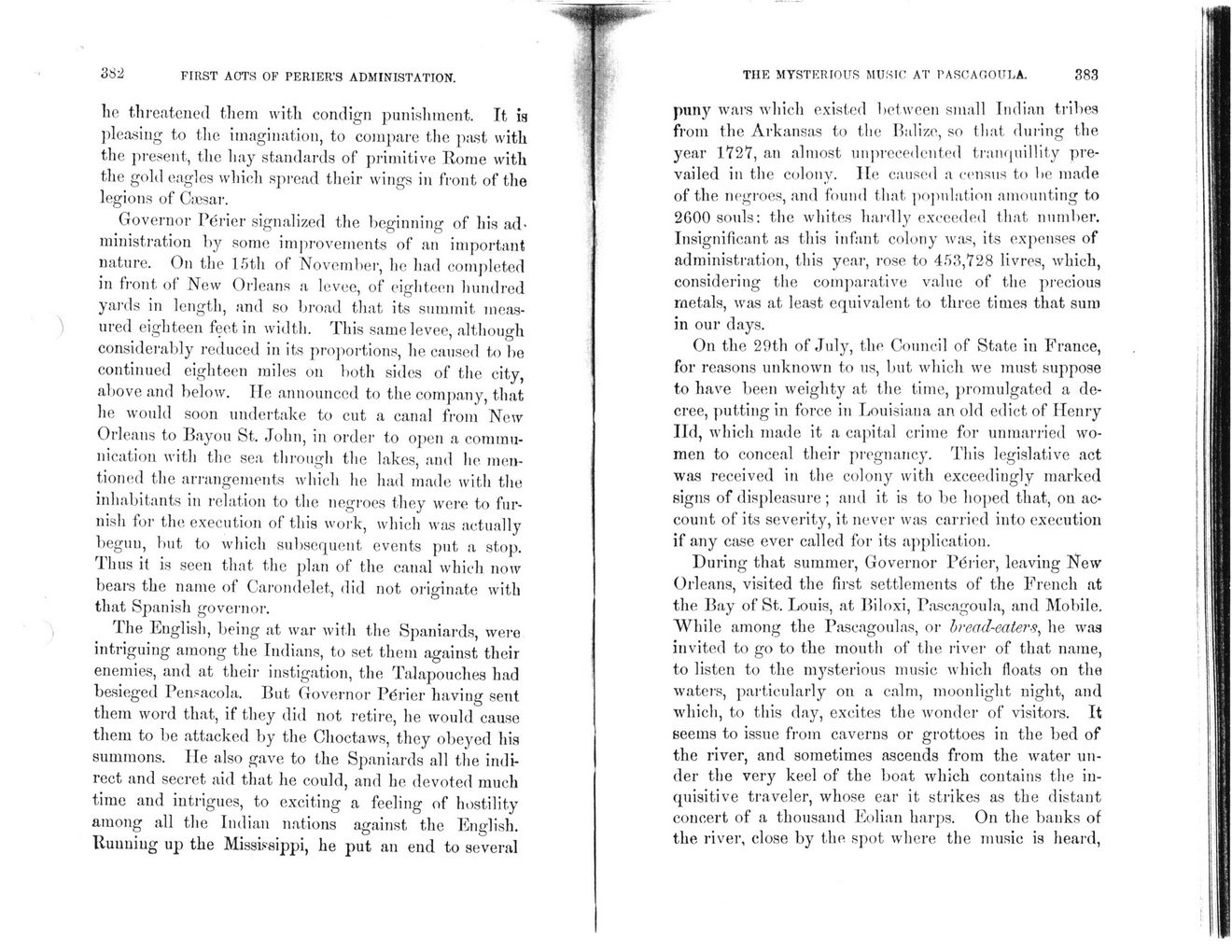This text was obtained via automated optical character recognition.
It has not been edited and may therefore contain several errors.
FIRST ACTS OF PERIER’S ADMINISTATION. lie threatened them with condign punishment. It is pleasing to the imagination, to compare the past with the present, the hay standards of primitive Home with the gold eagles which spread their wings in front of the legions of C;usar. Governor Perier signalized the beginning of his administration by some improvements of an important nature. On the 15th of November, he had completed in front of New Orleans n levee, of eighteen hundred yards in length, and so broad that its summit measured eighteen feet in width. This same levee, although considerably reduced in its proportions, he caused to be continued eighteen miles on both sides of the city, above and below. lie announced to the company, that he would soon undertake to cut a canal from New Orleans to Bayou St. John, in order to open a communication with the sea through the lakes, and he mentioned the arrangements which he had made with the inhabitants in relation to the negroes they were to furnish for the execution of this work, which was actually begun, but to which subsequent events put a stop. Thus if is seen that the plan of the canal which now bears the name of Carondelet, did not originate with that Spanish governor. The English, being at war with the Spaniards, were intriguing among the Indians, to set them against their enemies, and at their instigation, the Talapouches had besieged Pensacola. But Governor Perier having sent them word that, if they did not retire, he would cause them to be attacked by the Choctaws, they obeyed his summons. He also gave to the Spaniards all the indirect and secret aid that he could, and he devoted much time and intrigues, to exciting a feeling of hostility among all the Indian nations against the English. Running up the Mississippi, he put an end to several THE MYSTERIOUS MUSIC AT PASCAGOULA. 383 puny wars which existed between small Indian tribes from the Arkansas to the Balize, so that during the year 1727, an almost unprecedented tranquillity prevailed in the colony, lie caused a census to be made of the negroes, and found that, population amounting to 2G00 souls: the whites hardly exceeded that number. Insignificant as this infant colony was, its expenses of administration, this year, rose to 453,728 livres, which, considering the comparative value of the precious rnetals, was at least equivalent to three times that sum in our days. On the 29th of July, the Council of State in France, for reasons unknown to us, but which we must suppose to have been weighty at the time, promulgated a decree, putting in force in Louisiana an old edict of Henry lid, which made it a capital crime for unmarried women to conceal their pregnancy. This legislative act was received in the colony with exceedingly marked signs of displeasure; and it is to be hoped that, on account of its severity, it, never was carried into execution if any case ever called for its application. During that summer, Governor Pdrier, leaving New Orleans, visited the first settlements of the French at the Bay of St. Louis, at Biloxi, Pascagoula, and Mobile. While among the Paseagoulas, or bread-eater■?, he was invited to go to the mouth of the river of that name, to listen to the mysterious music which floats on the waters, particularly on a calm, moonlight night, and which, to this day, excites the wonder of visitors. It seems to issue from caverns or grottoes in the bed of the river, and sometimes ascends from the water under the very keel of the boat which contains the inquisitive traveler, whose ear it strikes as the distant concert of a thousand Eolian harps. On the banks of the river, close by the spot where the music is heard,

BSL 1970 To 1976 Pascagoula-1974-(2)